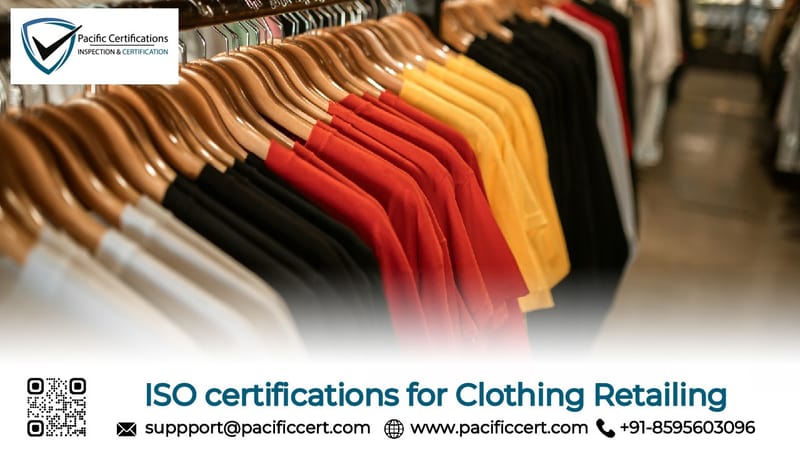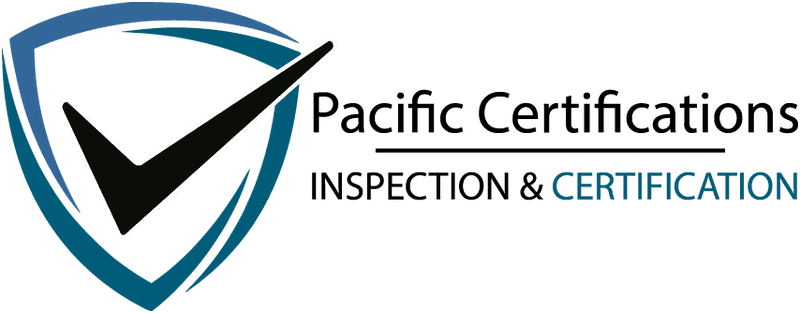ISO Certifications for Clothing Retailing Businesses, Requirements and Benefits

The clothing retail industry is one of the most competitive and fast-paced sectors globally. Retailers must consistently meet customer demands while maintaining high standards of quality and sustainability.
In such a dynamic environment, implementing ISO standards has become crucial for clothing retailers. ISO standards provide a structured framework that helps businesses operate efficiently, manage risks, and deliver high-quality products and services.
For clothing retailers, ISO standards address various aspects of retail operations, including quality management, environmental sustainability and occupational health and safety etc. By implementing ISO standards, clothing retailers can enhance their brand reputation and improve customer loyalty
Interested in ISO Certification for your Clothing Retail Business? Reach out to us at [email protected] or call +91-8595603096 to get started!
Applicable ISO Standards for Clothing Retailing
Several ISO standards cover different areas of retail operations and provide guidelines for achieving and maintaining excellence in various aspects of the business. Below are some of the most applicable ISO standards for clothing retailing:
ISO 9001: Quality Management Systems
ISO 9001 is one of the most widely recognized standards for quality management. It provides a framework for ensuring consistent quality in products and services, meeting customer expectations, and enhancing customer satisfaction. For clothing retailers ISO 9001 certification demonstrates a commitment to quality across the entire supply chain.
ISO 14001: Environmental Management Systems
ISO 14001 focuses on environmental management and helps organizations minimize their environmental impact. For clothing retailers, implementing ISO 14001 can lead to more sustainable practices, such as reducing waste, conserving resources, and promoting eco-friendly products.
ISO 45001: Occupational Health and Safety Management Systems
ISO 45001 provides guidelines for creating a safe and healthy work environment. In the clothing retail industry, this standard is particularly relevant for managing the health and safety of employees, especially in busy retail environments where the risk of accidents or injuries may be higher.
ISO 27001: Information Security Management Systems
ISO 27001 is essential for protecting sensitive information. This standard provides a framework for managing information security risks and ensuring the confidentiality, integrity, and availability of data.
ISO 50001: Energy Management Systems
ISO 50001 provides a framework for improving energy performance, reducing energy costs, and minimizing the environmental impact of energy use. Clothing retailers can benefit from ISO 50001 certification by optimizing their energy consumption, reducing operational costs and contributing to sustainability goals.
ISO 20400: Sustainable Procurement
ISO 20400 is a standard that guides sustainable procurement practices. For clothing retailers, this means sourcing materials and products in a way that is environmentally, socially, and economically sustainable.
ISO 22301: Business Continuity Management Systems
ISO 22301 focuses on business continuity management, ensuring that businesses can continue operations during and after a disruption. This standard is vital for managing risks related to supply chain disruptions, natural disasters, or other unforeseen events.
Click here to find out more applicable standards to your industry
For ISO Certification in Clothing Retailing, contact us today at [email protected] or call +91-8595603096. We're here to help!
How We Can Help
At Pacific Certifications, we understand the unique challenges faced by clothing retailers and offer tailored certification services that align with your business objectives. Our experienced auditors work closely with your team to assess your existing processes, identify areas for improvement and verify that your operations meet the stringent requirements of the chosen ISO standards.
It’s important to note that as a certification body we do not provide consultancy or implementation support. Our focus is solely on auditing and certification, ensuring that your business achieves and maintains ISO compliance with the highest level of integrity and professionalism.
Looking to enhance your Clothing Retail operations with ISO Certification? Email us at [email protected] or give us a call at +91-8595603096.
Requirements of ISO certifications for Clothing Retailer Businesses
Achieving ISO certification requires clothing businesses to meet specific requirements laid out in the relevant standards. These requirements include the following:
ISO 9001: Quality Management Systems
- Customer Focus: Understanding and meeting customer needs and expectations.
- Leadership: Establishing a clear vision, direction, and commitment to quality.
- Engagement of People: Ensuring that employees are competent, engaged, and empowered to contribute to quality.
- Process Approach: Managing activities as interconnected processes that function as a coherent system.
- Continuous Improvement: Committing to ongoing improvement of the quality management system.
- Evidence-Based Decision Making: Using data and analysis to make informed decisions.
- Relationship Management: Managing relationships with suppliers, customers, and other stakeholders to enhance performance.
ISO 14001: Environmental Management Systems
- Environmental Policy: Establishing a policy that reflects the organization’s commitment to environmental management.
- Environmental Aspects: Identifying and managing environmental aspects that can impact the environment.
- Compliance Obligations: Ensuring compliance with applicable environmental laws and regulations.
- Objectives and Targets: Setting measurable environmental objectives and targets for improvement.
- Operational Control: Implementing controls to manage environmental aspects and reduce environmental impact.
- Emergency Preparedness: Preparing for and responding to environmental emergencies.
ISO 45001: Occupational Health and Safety Management Systems
- Health and Safety Policy: Establishing a policy that reflects the organization’s commitment to health and safety.
- Hazard Identification and Risk Assessment: Identifying hazards, assessing risks, and implementing controls.
- Legal and Other Requirements: Complying with applicable health and safety laws and regulations.
- Health and Safety Objectives: Setting measurable health and safety objectives and targets.
- Competence and Training: Ensuring employees are trained and competent in health and safety matters.
- Incident Investigation and Corrective Action: Investigating incidents and implementing corrective actions to prevent recurrence.
ISO 27001: Information Security Management Systems
- Information Security Policy: Establishing a policy that reflects the organization’s commitment to information security.
- Risk Assessment and Treatment: Identifying and managing information security risks.
- Access Control: Implementing controls to manage access to information and systems.
- Incident Management: Preparing for and responding to information security incidents.
- Compliance with Legal and Regulatory Requirements: Ensuring compliance with information security laws and regulations.
ISO 50001: Energy Management Systems
- Energy Policy: Establishing a policy that reflects the organization’s commitment to energy management.
- Energy Planning: Identifying energy sources, assessing energy use, and setting energy performance objectives.
- Energy Review: Conducting a detailed review of energy use and identifying opportunities for improvement.
- Operational Control: Implementing controls to manage energy use and reduce energy consumption.
- Monitoring and Measurement: Monitoring energy performance and measuring energy consumption.
Get ISO Certified in Retailing business! Contact us at [email protected] or phone +91-8595603096 to begin your certification journey.
Benefits of ISO certifications for Clothing Retailing
Here is a detailed overview of the benefits for each of the ISO standards you mentioned:
- ISO 9001 helps organizations consistently meet customer requirements, which leads to increased customer satisfaction and loyalty.
- The ISO standards promote a process approach, improving operational efficiency and reducing waste.
- ISO Certifications are recognized globally, helping businesses compete in international markets.
- ISO 14001 helps organizations minimize their environmental footprint by improving resource efficiency and reducing waste.
- The ISO standards ensures that organizations comply with local laws and regulations.
- ISO 45001 helps create a safer workplace by identifying and controlling health and safety risks.
- ISO 27001 provides a framework for securing sensitive information, reducing the risk of data breaches and cyber-attacks.
- ISO 50001 helps organizations optimize their energy use, leading to significant reductions in energy consumption and costs.
- ISO 20400 helps organizations implement sustainable procurement practices, ensuring that suppliers meet ethical, environmental, and social criteria.
Each of these ISO standards offers specific benefits that address different aspects of business operations, from quality management to sustainability. Together, they provide a comprehensive framework for improving efficiency and achieving long-term success.
Ready to take your Clothing Retail business to the next level with ISO Certification? Contact us at [email protected] or call +91-8595603096.
Market News
The clothing retail industry is evolving rapidly, driven by changes in consumer behavior, technological advancements, and sustainability concerns. In this year, there is a growing demand for sustainable and ethically sourced products, as consumers become more conscious of the environmental and social impact of their purchases.
Retailers are increasingly adopting ISO standards like ISO 14001 and ISO 20400 to align with these trends and meet consumer expectations.
Additionally, the rise of e-commerce and digital transformation is reshaping the retail landscape. Retailers are investing in technology to improve the customer experience and enhance supply chain efficiency. ISO 27001 is becoming increasingly important for retailers to manage information security risks in this digital age.
ISO Certification for your Clothing Retailing firm is just a call or email away! Contact us at [email protected] or +91-8595603096 to learn more.
Certification Process
The certification process for ISO standards involves several key steps, each designed to ensure that the retailer meets the requirements of the chosen standards. Here’s an overview of the certification process:
Initial Consultation
The certification process begins with an initial consultation with Pacific Certifications. During this consultation, we discuss your specific needs, the ISO standards you wish to pursue and the scope of certification.
Gap Analysis (Optional)
Although we do not provide gap analysis services, we can recommend that retailers conduct an internal gap analysis or engage a consultant to identify areas that require improvement before the formal audit.
Documentation Review
Pacific Certifications will review your documentation to ensure it meets the requirements of the relevant ISO standards.
Stage 1 Audit (Pre-assessment)
The Stage 1 audit is a preliminary assessment of your organization’s readiness for certification. We assess the documentation and identify any potential issues that need to be addressed before the Stage 2 audit.
Stage 2 Audit (Certification Audit)
The Stage 2 audit is a comprehensive assessment of your organization’s compliance with the ISO standards. Our auditors will conduct on-site assessments, review processes, interview employees, and verify that your operations meet the requirements of the standards.
Certification Decision
Based on the results of the Stage 2 audit, Pacific Certifications will make a certification decision. If your organization meets the requirements, we will issue the ISO certification, valid for three years.
Surveillance Audits
To maintain certification, your organization must undergo regular surveillance audits. These audits ensure that you continue to meet the ISO standards and are committed to continuous improvement.
Re-certification Audit
At the end of the three-year certification cycle, a recertification audit is conducted to renew your ISO certification.
For more information on how we can assist with your ISO certification needs, please contact us!
Pacific Certifications is accredited by ABIS, in case you need support with ISO certification for your Clothing Retailing business, please contact us at [email protected] or +91-8595603096.
FAQs: ISO Certifications for Clothing Retailing
Q1: What is the most important ISO standard for clothing retailers?
While all relevant ISO standards are important, ISO 9001 (Quality Management Systems) is often considered the most critical for clothing retailers as it focuses on delivering consistent quality and enhancing customer satisfaction.
Q2: How long does it take to get ISO certified?
The time required to achieve ISO certification varies depending on the complexity of your business and the specific ISO standards you are pursuing. Generally, it can take anywhere from a few months to a year.
Q3: Do I need to implement all the ISO standards mentioned for clothing retailing?
No, you do not need to implement all the standards. The choice of standards depends on your specific business needs, objectives, and the areas you want to focus on, such as quality, environmental management, or information security.
Q4: What is the cost of ISO certification?
The cost of ISO certification varies based on factors such as the size of your organization, the complexity of your operations, and the specific standards you are pursuing. Contact us for a customized quote.
Q5: How often do we need to undergo audits after certification?
After achieving ISO certification, your organization will need to undergo regular surveillance audits, typically annually, to ensure continued compliance. A recertification audit is required every three years.
Read More at: Blogs by Pacific Certifications

